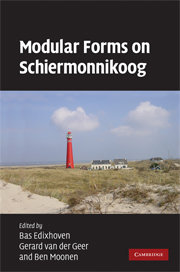9 results
Generators for modules of vector-valued Picard modular forms
-
- Journal:
- Nagoya Mathematical Journal / Volume 212 / December 2013
- Published online by Cambridge University Press:
- 11 January 2016, pp. 19-57
- Print publication:
- December 2013
-
- Article
-
- You have access
- Export citation
Contents
-
- Book:
- Modular Forms on Schiermonnikoog
- Published online:
- 08 October 2009
- Print publication:
- 27 November 2008, pp v-vi
-
- Chapter
- Export citation
List of contributors
-
- Book:
- Modular Forms on Schiermonnikoog
- Published online:
- 08 October 2009
- Print publication:
- 27 November 2008, pp viii-x
-
- Chapter
- Export citation
Frontmatter
-
- Book:
- Modular Forms on Schiermonnikoog
- Published online:
- 08 October 2009
- Print publication:
- 27 November 2008, pp i-iv
-
- Chapter
- Export citation

Modular Forms on Schiermonnikoog
-
- Published online:
- 08 October 2009
- Print publication:
- 27 November 2008
Preface
-
-
- Book:
- Modular Forms on Schiermonnikoog
- Published online:
- 08 October 2009
- Print publication:
- 27 November 2008, pp vii-vii
-
- Chapter
- Export citation
1 - Modular Forms
-
-
- Book:
- Modular Forms on Schiermonnikoog
- Published online:
- 08 October 2009
- Print publication:
- 27 November 2008, pp 1-12
-
- Chapter
- Export citation
Cycle relations on Jacobian varieties
-
- Journal:
- Compositio Mathematica / Volume 143 / Issue 4 / July 2007
- Published online by Cambridge University Press:
- 17 July 2007, pp. 900-908
- Print publication:
- July 2007
-
- Article
-
- You have access
- Export citation
AN ASYMPTOTICALLY GOOD TOWER OF CURVES OVER THE FIELD WITH EIGHT ELEMENTS
-
- Journal:
- Bulletin of the London Mathematical Society / Volume 34 / Issue 3 / May 2002
- Published online by Cambridge University Press:
- 22 May 2002, pp. 291-300
- Print publication:
- May 2002
-
- Article
- Export citation



